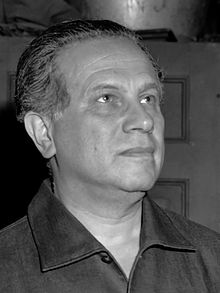Antal Doráti
This article needs additional citations for verification. (August 2015) |

Antal Doráti
Biography
Antal Doráti was born in Budapest to a Jewish family. His father Alexander Doráti was a violinist with the Budapest Philharmonic Orchestra and his mother Margit Kunwald was a piano teacher.
He studied at the
He made his conducting debut in 1924 with the Budapest Royal Opera.
As well as composing original works, he compiled and arranged pieces by Johann Strauss II for the ballet Graduation Ball (1940), premiered by the Original Ballet Russe in Sydney, Australia, with himself on the conductor's podium. For Ballet Theatre (later renamed American Ballet Theatre) he created scores for the ballets Bluebeard (1941) from music by Jacques Offenbach and The Fair at Sorochinsk (1943) from music by Modest Mussorgsky.
His autobiography, Notes of Seven Decades, was published in 1979.
In 1983, Doráti was appointed an honorary Knight Commander of the Order of the British Empire (KBE).
His wife was Ilse von Alpenheim, an Austrian pianist. Doráti died at the age of 82 in Gerzensee, Switzerland.
Career
Doráti held posts as principal conductor of the following orchestras:
- Ballet Russe, Music Director (1937–1941).
- Ballet Theatre orchestra (1941–1945).
- Dallas Symphony Orchestra (1945–1948)
- Minneapolis Symphony Orchestra (1949–1960)
- BBC Symphony Orchestra (1963–1966), which bid him a fond farewell playing his Symphony in Five Movements and his Madrigal Suite.
- Stockholm Philharmonic Orchestra (1966–74), with which he recorded his Symphony No. 1 and his Symphony No. 2, "Querela Pacis" on the BIS label. He took that orchestra on its first international tours.
- National Symphony Orchestra in Washington, D.C. (1970–1977), which he rescued from bankruptcy and a players' strike.
- Detroit Symphony Orchestra (1977–1981)
- Royal Philharmonic Orchestra (1975–1979)
Recordings
He made his first recording with the London Philharmonic Orchestra for the recording label His Master's Voice. This was later transferred to RCA Records with whom HMV were for some time associated. Over the course of his career Doráti made over 600 recordings.
With the Philharmonia Hungarica, Doráti was the second conductor to record the complete symphonies of Joseph Haydn (the first complete recorded edition was conducted by Ernst Märzendorfer and the Vienna Chamber Orchestra, but it had a very limited release). He also recorded an unprecedented cycle of Joseph Haydn's operas and Ottorino Respighi's Ancient Airs and Dances, Suites 1, 2 and 3.[4]
Doráti became especially well known for his recordings of
Other prominent composers in Doráti's recording career were Béla Bartók and Igor Stravinsky. His comprehensive series of Bartók's orchestral works for Mercury have been brought together on a 5-CD set.
He also made the first stereo recording of Léo Delibes' Coppélia, with the Minneapolis Symphony Orchestra. An album set of Wagner's Der fliegende Holländer is also among Doráti's popular recordings.
In 1969 he made the world premiere recording of Sibelius's tone poem Luonnotar, with Gwyneth Jones as soprano soloist. In 1973 he conducted the world premiere recording of Max Bruch's Concerto for Two Pianos and Orchestra, which was written in 1912 but only rediscovered in 1971.
In 1969 with the
He made
See also
- Haydn: La fedeltà premiata (Antal Doráti recording)
- Haydn: Il mondo della luna (Antal Doráti recording)
References
- ^ "Doráti". Collins English Dictionary. HarperCollins. Retrieved 6 August 2019.
- ^ "Dorati, Antal". Lexico US English Dictionary. Oxford University Press. Archived from the original on 2 September 2022.
- ^ "BBC Radio 4 – Desert Island Discs, Antal Dorati". Bbc.co.uk. 25 July 1960. Retrieved 17 August 2015.
- ^ Mercury 434 304-2, 6/1958
- ISBN 0-214-20512-6.
Further reading
- S2CID 145376110.
- Dorati, Antal (1979). Notes of seven decades. London: Hodder and Stoughton. OCLC 6330598.
- Chlupaty, Richard (2006). Antal Doráti and the joy of making music. The Antal Doráti Centenary Society. OCLC 81249116.
- Chlupaty, Richard (2013). Antal Doráti and his recorded legacy. United Kingdom: Antal Doráti Centenary Society. OCLC 853247311.
External links
- Antal Doráti official website
- Antal Doráti at AllMusic
- Antal Dorati Centenary Society
- Antal Doráti interview, 3 November 1985
